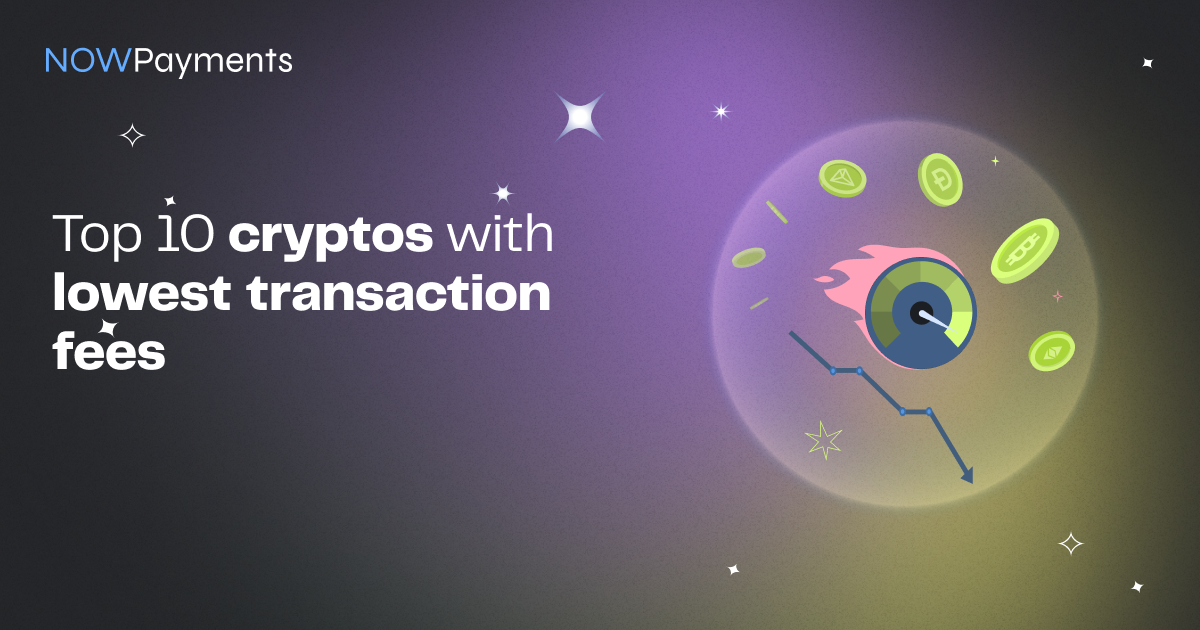Cryptocurrencies have increasingly become popular due to their ability to offer rapid, low-cost transactions, making them ideal for money transfer solutions. Among the cheapest cryptocurrencies, Nano and Stellar stand out for providing much lower transaction fees compared to traditional payment methods. These cryptocurrencies not only ensure that users can save on fees but also allow for instantaneous transfers, which is perfect for users who require fast and affordable payment methods. Each crypto project, from Litecoin to IOTA, offers unique features, but their shared focus on reducing costs per transfer is what appeals to a broad audience seeking alternatives to conventional banking fees. For businesses and individuals alike, choosing low-fee cryptocurrencies like Bitcoin SV or Zilliqa can be a game-changer in terms of cost savings. Not only do these projects focus on offering much lower transaction fees than traditional banking systems, but they also streamline the process of money transfer, allowing users to send funds internationally without worrying about excessive costs. By embracing these cost-effective options, users can save on fees while benefiting from the reliability and efficiency that these cheapest cryptocurrencies provide.
The best cryptocurrency in our rating is Nano because it offers some of the lowest transaction fees in the market, making it an ideal choice for users who prioritize cost-effective transactions. Unlike many other cryptocurrencies that may impose high fees during peak times, Nano utilizes a unique block-lattice architecture that enables instant transactions without any fees. This innovative approach enhances user experience and encourages everyday use, as individuals can send and receive funds without worrying about additional costs. As a result, Nano stands out as a leading option for those seeking efficient and affordable cryptocurrency transactions.
Crypto transactions can be not just much cheaper than fiat, but often they can be absolutely free of charge, offering a significant advantage in terms of fee comparison. Several cryptocurrencies stand out for their low transaction fees, making them ideal for cost-effective payments. NOWPayments, a platform that facilitates seamless transactions, offers users the ability to pay with a wide range of cryptocurrencies, all while maintaining some of the lowest fees in the market. Below is a list of cryptocurrencies that are particularly known for their low transaction costs:
- Nano
- Stellar
- Litecoin
- Dash
- Digibyte
- Zilliqa
- EOS
- Tron
- IOTA
- Bitcoin SV
| Cryptocurrency | Transaction Speed | Scalability | Low Transaction Fees |
|---|---|---|---|
| Nano | 1-2 seconds | 1,000+ TPS | Zero fees |
| Stellar | 3-5 seconds | Thousands TPS | ~$0.00001 per transaction |
| Litecoin | 2.5 minutes | 56 TPS | ~$0.01 per transaction |
| Dash | <1 second (InstantSend) | 56 TPS | ~$0.01 per transaction |
| Digibyte | 15 seconds | 280 TPS | < $0.01 per transaction |
| Zilliqa | 2,800+ TPS | Virtually unlimited | < $0.01 per transaction |
| EOS | Up to 4,000 TPS | Thousands TPS | Zero fees |
| Tron | 2,000+ TPS | High scalability | < $0.01 per transaction |
| IOTA | Seconds (Instant) | High scalability | Zero fees |
| Bitcoin SV | Faster than Bitcoin | 1000s TPS | < $0.01 per transaction |
Nano
The Nano cryptocurrency aims to be a digital currency for everyday use, following Bitcoin’s original vision. It features a robust consensus mechanism and charges no transaction fees. Utilizing Directed Acyclic Graph (DAG) technology, each user operates on their own blockchain, ensuring minimal network fees. The Nano network offers fee-free and fast transactions, making it ideal for commercial use and micropayments, eliminating concerns over transaction costs.
Transaction Speed. Nano offers near-instant transaction confirmations, typically within 1-2 seconds. Its block-lattice structure allows for rapid peer-to-peer transactions without requiring miners or time-consuming consensus validation. The system ensures that every transaction is processed almost immediately, making it perfect for real-time payments such as booking airline tickets or making in-store purchases. Unlike traditional cryptocurrencies like Bitcoin, where transactions can take minutes or even hours to confirm, Nano guarantees fast, reliable payment processing.
Scalability. Nano’s design supports high scalability, capable of processing over 1000 transactions per second (TPS) on its network. Unlike blockchain systems that depend on a single chain, Nano’s block-lattice structure allows each user to manage their blockchain, preventing bottlenecks and enabling efficient scaling. The lack of transaction fees further enhances the network’s scalability, enabling it to handle large volumes of activity without slowing down. As a result, Nano can accommodate growing user bases and increasing transaction loads without compromising speed or performance.
Low Transaction Fees. Nano operates with zero transaction fees, meaning there are no costs associated with sending or receiving funds on the network. This stands in stark contrast to other cryptocurrencies like Bitcoin or Ethereum, which can charge fees ranging from a few cents to several dollars per transaction, especially during high network congestion. By removing transaction fees entirely, Nano ensures that users can make frequent, small transfers without the burden of escalating costs. This makes it a highly attractive option for use cases where low-cost, high-frequency payments are critical.
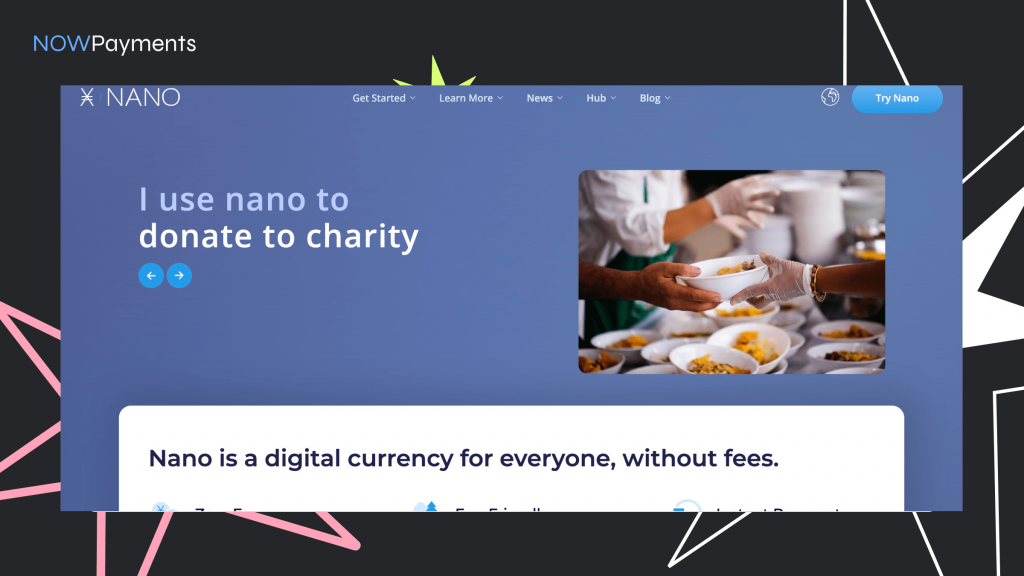
Stellar
Stellar is a cryptocurrency known for its low transaction fees, designed to facilitate fast, cross-border payments. With a focus on financial inclusion, Stellar allows users to send funds with minimal costs, making it ideal for remittances and micropayments. The Stellar network supports quick, low-cost transactions and is widely used for transferring money across different currencies and borders, making it an attractive option for businesses and individuals alike. Its low transaction fees, often less than a cent, enable it to compete effectively with traditional financial systems.
Transaction Speed. Stellar provides swift transaction speeds, confirming most payments in just 3-5 seconds. This is made possible by the Stellar Consensus Protocol (SCP), which enables faster transaction processing without the need for miners. As a result, Stellar is able to handle high transaction volumes while maintaining low latency. This capability makes it ideal for applications requiring near-instant settlement, such as buying airline tickets or processing international payments.
Scalability. Stellar is highly scalable, capable of processing thousands of transactions per second (TPS) due to its efficient consensus mechanism. Unlike other blockchains, Stellar’s decentralized network does not require heavy computational power to verify transactions, allowing for smooth scaling even as user demand increases. Its design also ensures that transaction costs remain low even as the network grows. This scalability is key for Stellar’s adoption in industries like remittances and international money transfers, where high transaction volumes are common.
Low Transaction Fees. Stellar’s transaction fees are among the lowest in the cryptocurrency space, typically costing around 0.00001 XLM (less than a cent). This low fee structure is a key feature of Stellar, making it an attractive option for users who need to send small amounts of money or conduct frequent transactions. The minimal cost allows Stellar to be a practical choice for cross-border payments and micropayments. With low fees and fast transaction times, Stellar provides a cost-effective solution for businesses and individuals looking to use cryptocurrency for everyday transactions.
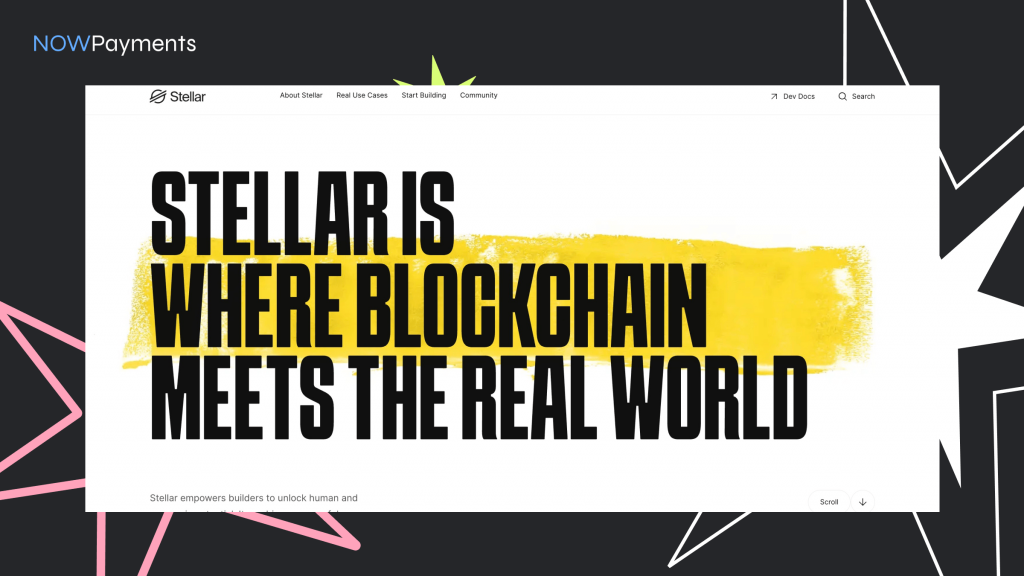
Litecoin
Litecoin is a peer-to-peer cryptocurrency designed to offer lower transaction fees compared to Bitcoin. As one of the oldest cryptocurrencies, Litecoin allows users to send payments quickly and cost-effectively, particularly for everyday transactions. With a focus on faster block generation times, Litecoin ensures a smooth user experience with low-cost transfers. The network charges fees that are typically a fraction of Bitcoin’s, making it a preferred option for small transactions. This unique feature not only appeals to everyday users looking to make quick transfers but also positions Litecoin as a strong competitor in the cryptocurrency market, especially for those who prioritize affordability in their digital transactions.
Transaction Speed. Litecoin’s block generation time is just 2.5 minutes, much faster than Bitcoin’s 10-minute block times. This allows for quicker transaction confirmations, making it a solid option for users looking for fast payments. The network’s faster processing speeds are beneficial for real-time transactions like buying goods and services. The reduced block time helps maintain a steady flow of transactions, even during high-demand periods.
Scalability. Litecoin can handle around 56 transactions per second (TPS), significantly more than Bitcoin’s 7 TPS. This scalability allows the network to support higher transaction volumes without slowing down. Litecoin’s increased transaction throughput is achieved through its faster block times and lightweight network structure. Litecoin’s scalability makes it a perfect choice for everyday consumer use and micropayments.
Low Transaction Fees. Litecoin’s transaction fees are among the lowest in the industry, typically around $0.01 per transaction. This fee structure makes Litecoin highly appealing for those looking to avoid high transaction costs, especially for smaller transfers. Its low fees make it an attractive choice for both personal use and businesses accepting crypto payments. For users who want to send funds without high fees, Litecoin provides an efficient solution.

Dash
Dash is a cryptocurrency designed to provide fast, low-cost transactions, making it a popular choice for users seeking to make everyday payments. With its focus on both privacy and speed, Dash enables quick transactions with minimal fees, appealing to both consumers and businesses. Dash employs a unique two-tier network with miners and masternodes to ensure fast and secure payments. The low transaction fees make Dash a suitable option for users looking to send funds quickly without incurring hefty costs.
Transaction Speed. Dash’s InstantSend feature allows transactions to be confirmed in less than 1 second, making it one of the fastest cryptocurrencies available. This rapid processing is ideal for real-time transactions, such as in-store purchases or international transfers. By leveraging masternodes for instant transaction validation, Dash can process payments nearly instantaneously. The fast transaction speed ensures that users can complete their payments without delays or waiting for confirmations. Additionally, this efficiency enhances user experience and encourages more frequent use of Dash for various financial activities, further establishing it as a leading choice among cryptos with the lowest transaction fees.
Scalability. Dash is a cryptocurrency that can handle approximately 56 transactions per second, making it an ideal choice for high-volume usage due to its impressive scalability. One of the key features that contribute to this efficiency is the utilization of masternodes, which allows the network to process a significantly larger number of transactions effectively. This decentralized system not only enhances the transaction capacity but also ensures that the network maintains its speed even as more users join. Consequently, Dash’s scalability ensures that it can accommodate a growing user base without compromising on either transaction speed or cost, making it a strong contender among cryptos with the lowest transaction fees.
Low Transaction Fees. Dash’s transaction fees are typically very low, averaging around $0.01 per transaction. These minimal fees make it a cost-effective option for users and merchants alike, allowing for seamless transactions without the burden of high costs. Dash’s low fees are possible due to its dual-layer architecture, which not only enhances security but also optimizes transaction validation, resulting in faster processing times. The affordable transaction fees make Dash an appealing cryptocurrency for small transfers and everyday transactions, attracting a wide range of users who seek efficiency and cost savings in their digital currency dealings.

Digibyte
DigiByte is a decentralized cryptocurrency designed for secure, fast, and low-cost transactions. The network uses a multi-algorithm mining approach to secure its blockchain, ensuring fast block times and low fees. With its scalability and strong security measures, Digibyte is designed to handle a wide range of transaction volumes. Its focus on low-cost transactions makes it an excellent option for users who need affordable, quick payments.
Transaction Speed. Digibyte offers one of the fastest transaction speeds in the industry, with block times of just 15 seconds. This quick block generation allows for nearly instant transaction confirmations, making it an appealing option for users who prioritize speed in their transactions. The network’s impressive speed is particularly beneficial for those engaged in e-commerce or micropayments, where timely processing is crucial. Additionally, Digibyte’s efficient handling of high-volume transactions further enhances its attractiveness as a cryptocurrency, especially for those looking for cryptos with the lowest transaction fees while still ensuring rapid and reliable service.
Scalability. Digibyte is an impressive cryptocurrency that can process up to 280 transactions per second (TPS), which is significantly higher than many other cryptocurrencies currently available in the market. This remarkable scalability ensures that Digibyte can effectively support a growing user base while maintaining optimal performance, making it a reliable choice for various applications. The network’s ability to scale efficiently is further enhanced by its unique multi-algorithm mining process, which not only allows for increased throughput but also promotes decentralization and security. As a result, Digibyte’s high scalability positions it as a suitable option for a wide range of use cases, including large-scale enterprise adoption, where speed and efficiency are critical factors for success.
Low Transaction Fees. Digibyte’s transaction fees are extremely low, typically under $0.01 per transaction. This makes it one of the most affordable cryptocurrencies for users making frequent or small transactions. The low fees enable Digibyte to compete with traditional payment systems while offering the benefits of blockchain technology. For users looking for an affordable payment solution, Digibyte’s low fees provide a significant advantage, allowing them to save on costs while still enjoying the security and efficiency that digital currencies offer. This affordability can be particularly beneficial for businesses and individuals who rely on small transactions, further enhancing the appeal of Digibyte in the competitive landscape of cryptocurrencies with the lowest transaction fees.

Zilliqa
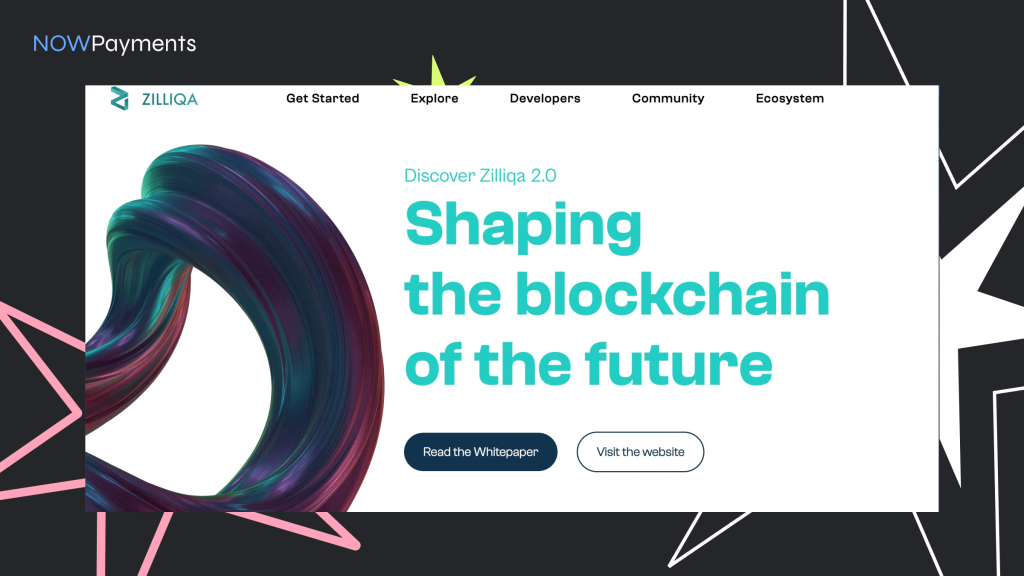
Zilliqa is a scalable blockchain platform designed for creating decentralized applications with high transaction processing speed. This project garners interest primarily due to its innovative Sharding technology, which effectively addresses the scalability problem by ensuring that bandwidth increases linearly as the network expands. Essentially, Zilliqa stands as a robust competitor to Ethereum, emphasizing extensive scaling capabilities, high throughput, and sharding mechanisms. It shares a similar ethos with EOS, focusing on the elimination of gas fees to enhance the user experience when sending cryptocurrency. Additionally, users of Cardano also enjoy swift transaction speeds complemented by incredibly low fees, which are just 0.1 ZIL. Given that the current price of ZIL is less than half a cent, these transaction fees are remarkably low, making Zilliqa an attractive option for those seeking cryptocurrencies with minimal transaction costs.
Transaction Speed. Zilliqa can process over 2,800 transactions per second, thanks to its innovative sharding technology. Sharding allows the network to split tasks into smaller parts and process them in parallel, drastically improving transaction speeds. This enables users to send and receive payments almost instantly. The high transaction speed makes Zilliqa suitable for applications that demand rapid processing, such as financial services or decentralized apps.
Scalability. Zilliqa’s sharding architecture allows for virtually unlimited scalability. By dividing the network into smaller shards, the platform can handle a massive number of transactions simultaneously without network slowdowns. This scalability is crucial for enterprises and applications that require high throughput. As more users join the network, Zilliqa’s scalability ensures that transaction performance remains consistent.
Low Transaction Fees. Zilliqa offers very low transaction fees, often below $0.01 per transaction. Its efficient sharding process helps reduce the computational costs associated with processing transactions, resulting in minimal fees. These low fees make Zilliqa an attractive option for both users and developers of decentralized applications. Whether for microtransactions or large-scale payments, Zilliqa provides a cost-effective solution for blockchain users.
EOS
EOS is a blockchain platform designed to provide fast, scalable, and low-cost transactions. With its delegated proof-of-stake (DPoS) consensus mechanism, EOS can process a large number of transactions quickly and with minimal fees, making it an attractive option for developers and enterprises alike. For decentralized applications (dApps) that demand efficient and reliable performance, the platform’s architecture optimizes for high throughput. As a result, EOS has become a popular choice among developers seeking a blockchain solution that not only meets their scalability needs but also offers the advantage of low transaction fees, facilitating a smoother user experience for digital services and applications.
Transaction Speed. EOS can process thousands of transactions per second, with estimates reaching up to 4,000 TPS. This high throughput is made possible by its DPoS consensus mechanism, which enables faster block production and validation. The network’s quick transaction speeds are ideal for real-time applications, such as gaming or financial transactions. EOS’s speed ensures that users can make instant transactions without delays.
Scalability. EOS is known for its ability to scale effectively, handling thousands of transactions per second without congestion. The use of DPoS allows for greater scalability compared to traditional proof-of-work blockchains. EOS can support high-demand applications and networks, maintaining high performance even as usage increases. This scalability is key for businesses and developers who require a robust platform for their decentralized applications.
Low Transaction Fees. EOS offers zero transaction fees for users, as it is based on a resource allocation system rather than traditional transaction fees. Instead of paying fees per transaction, users stake EOS tokens to gain access to network resources. This system allows for unlimited transactions without incurring any fees, making EOS highly attractive for developers and users of dApps. Its fee-free structure ensures that EOS remains an affordable platform for decentralized applications.
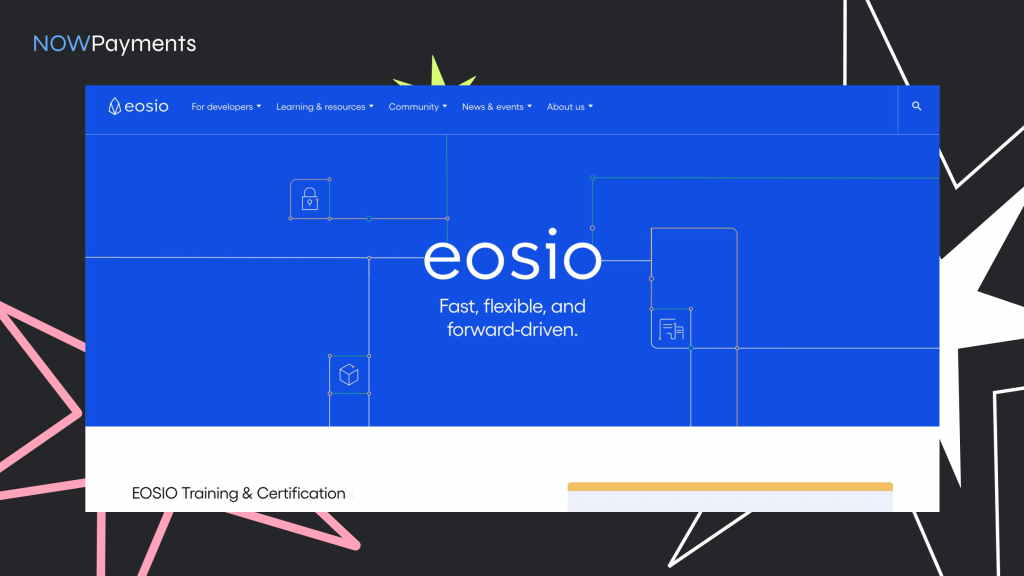
Tron
Tron is one of the most popular and in-demand blockchains on the market. The project was launched in 2017, and in just a few years its capitalization has reached more than 6 million, and the coin itself is in the top 30 according to CoinMarketCap. The distinctive features of Tron are its lightning-fast transactions and near-zero fees, making it an attractive option for those seeking cryptos with the lowest transaction fees. Due to such features, Tron is the main competitor of Ethereum. We can say that Tron is superior to Ethereum, including in terms of the consensus algorithm, as the latter is only planning to switch to PoS. Other popular coins have also been launched on the Tron blockchain, for example, the USDT stablecoin.
Transaction Speed. Tron’s network can process over 2,000 transactions per second, making it one of the fastest cryptocurrencies in terms of throughput. This high transaction speed is ideal for decentralized applications (dApps) and platforms that require rapid processing, allowing users to engage seamlessly with various services and functionalities. Tron’s consensus mechanism, based on delegated proof-of-stake (DPoS), not only enhances the network’s efficiency but also ensures fast transaction validation and minimal latency, which are critical factors for maintaining user satisfaction. The impressive speed of the network supports real-time payments, facilitating smooth transactions for both users and developers, thereby positioning Tron as a strong contender among cryptos with the lowest transaction fees.
Scalability. Tron’s high scalability allows it to process large volumes of transactions without sacrificing performance, making it one of the most efficient cryptos with the lowest transaction fees. The network’s Delegated Proof of Stake (DPoS) consensus mechanism enables it to scale efficiently as more users and decentralized applications (dApps) are added to the platform. This characteristic of Tron’s scalability is particularly advantageous for applications with high transaction demands, such as gaming and media platforms, where quick and cost-effective transactions are crucial. As the network continues to grow, it can seamlessly accommodate increasing transaction volumes without experiencing any slowdowns, ensuring that users can enjoy a smooth and efficient experience.
Low Transaction Fees. Tron offers extremely low transaction fees, often under $0.01 per transaction, with many transactions being completely fee-free. Its low fees come from its efficient Delegated Proof of Stake (DPoS) system and how it manages resources, which makes the process faster and cheaper. Tron’s minimal fees attract both users and businesses seeking cost-effective, high-speed payment solutions. Whether for microtransactions or larger payments, Tron ensures that users can send funds without worrying about high fees, thus enhancing the overall user experience and making it a preferred choice in the realm of cryptocurrencies with the lowest transaction fees.
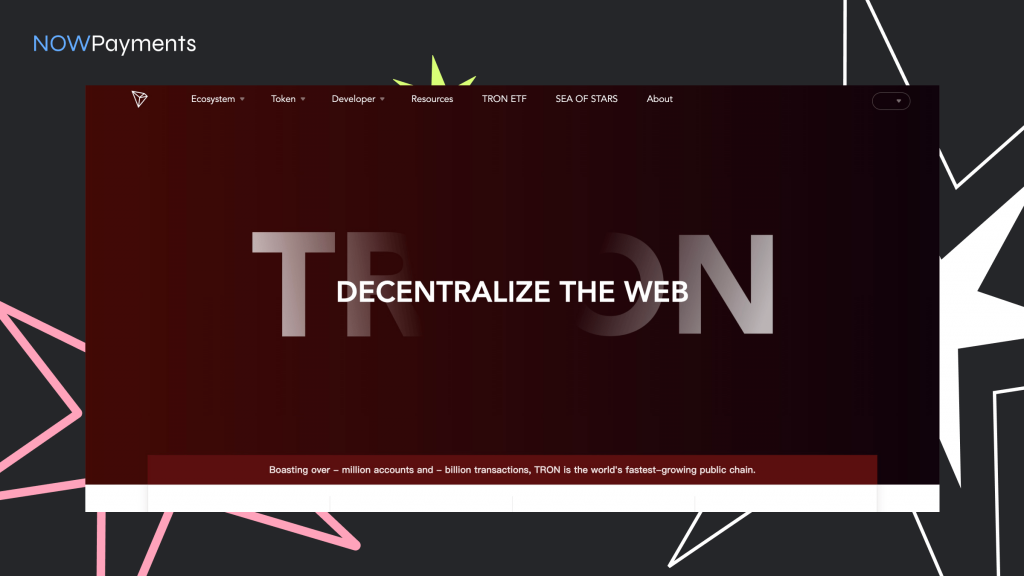
IOTA
IOTA is a cryptocurrency designed to provide fee-less transactions and scalable solutions for the Internet of Things (IoT). Unlike traditional blockchain systems, IOTA uses a unique structure called the Tangle, which eliminates miners and transaction fees. This innovative approach enables the network to handle microtransactions efficiently and cost-effectively, making it an ideal solution for IoT applications. With IOTA’s cutting-edge architecture, users can send funds without the burden of transaction fees, allowing for seamless transfers even for small or frequent transactions, thereby enhancing the overall user experience in the realm of digital currencies.
Transaction Speed. IOTA offers fast transaction speeds, with confirmations taking just seconds. The Tangle, a directed acyclic graph (DAG) system, ensures that transactions are processed in parallel, rather than sequentially. This innovative design allows IOTA to process multiple transactions simultaneously, significantly improving the network’s speed and efficiency. As a result, the near-instant confirmation times make IOTA a particularly good fit for real-time applications such as the Internet of Things (IoT) and microtransactions, where quick and low-cost transactions are essential for optimal performance and user experience.
Scalability. IOTA’s Tangle architecture allows the network to scale effectively, with each new transaction helping to validate previous ones. This unique system ensures that the network can handle an increasing number of transactions without slowing down, making it particularly advantageous for applications that require rapid processing times. IOTA’s scalability is critical for Internet of Things (IoT) applications, where the number of devices generating data and payments can grow exponentially. As the network expands, IOTA’s innovative structure guarantees that it can maintain high throughput and low latency, which are essential for seamless operations in a rapidly evolving digital landscape. This capability positions IOTA as a strong contender among cryptos with the lowest transaction fees, catering to users seeking efficient and cost-effective solutions for their transaction needs.
Low Transaction Fees. IOTA’s transaction fees are effectively zero, as there are no miners or validators involved in the process. This fee-less structure makes it ideal for microtransactions, where traditional fees would be prohibitive. Applications requiring frequent, small transfers, such as IoT devices communicating with each other, can use IOTA due to its lack of transaction fees. With no fees, IOTA ensures that users can send funds without worrying about the costs associated with traditional blockchain systems. This unique feature not only enhances the usability of IOTA for various applications but also positions it as a leading option among cryptos with lowest transaction fees, allowing for seamless and efficient transactions in an increasingly digital landscape.

Bitcoin SV
Bitcoin SV is a cryptocurrency that focuses on providing low-cost, scalable transactions. By aiming to restore the original vision of Bitcoin, it increases block size and enhances scalability, which ultimately leads to lower transaction fees. Designed for large-scale applications, Bitcoin SV caters to enterprise adoption and cross-border payments, ensuring that users can conduct transactions efficiently and affordably. Its commitment to maintaining low transaction fees makes it an appealing choice for those looking for effective blockchain solutions without incurring high costs.
Transaction Speed. Bitcoin SV processes transactions faster than Bitcoin due to its increased block size, enabling faster block confirmations. With block sizes reaching up to 128 MB, Bitcoin SV can handle significantly more transactions per block, which results in quicker processing times compared to Bitcoin, which has a 1 MB block size. This enhanced capacity allows Bitcoin SV to accommodate larger transaction volumes while maintaining faster processing speeds, making it an attractive option for users looking for efficiency in their cryptocurrency transactions. As a result, Bitcoin SV stands out in the landscape of cryptocurrencies, especially for those interested in minimizing transaction fees and maximizing speed.
Scalability. Bitcoin SV’s scalability is achieved by supporting larger block sizes, allowing the network to handle a higher volume of transactions. With block sizes of up to 128 MB, Bitcoin SV can process thousands of transactions per second, making it an attractive option for those seeking cryptos with the lowest transaction fees. This scalability is crucial for enterprise applications and large-scale use cases that require high throughput, ensuring that businesses can operate efficiently without incurring high costs. As Bitcoin SV’s block size continues to increase, the network can scale further without sacrificing performance, solidifying its position as a leading choice for users looking to minimize transaction expenses.
Low Transaction Fees. Bitcoin SV offers low transaction fees, often less than a cent per transaction, due to its larger block sizes and increased network capacity. By allowing for more transactions per block, Bitcoin SV reduces congestion and transaction costs, making it more efficient for users. This unique feature positions Bitcoin SV as an appealing choice for businesses and individuals who want to avoid the high fees typically associated with other cryptocurrencies. Its fee structure not only enables efficient payments for small transactions but also ensures that larger transactions can be conducted cost-effectively, further enhancing its attractiveness in a competitive market.

NOWPayments solution
With NOWPayments, you can easily and quickly add more than 300 cryptocurrencies as a payment option for your goods or services. This innovative platform enables you to accept crypto payments seamlessly in your e-commerce store by simply installing one of our user-friendly plugins, which are available for all major CMS solutions. Additionally, you can integrate crypto as a payment method on any website, application, or platform by utilizing our robust crypto API. For those seeking a convenient way to manage transactions, we offer the ability to create invoices that facilitate the fast acceptance of crypto payments while ensuring some of the lowest fees in the industry. Furthermore, our services extend to brick-and-mortar establishments, such as restaurants and retail stores, through the use of our POS terminal, making the process of accepting crypto easy, fast, and cost-effective.

Conclusion
In conclusion, as the demand for fast, efficient, and affordable payment solutions grows, cryptocurrencies with low transaction fees, such as Nano, Stellar, Litecoin, Dash, Digibyte, Zilliqa, EOS, Tron, IOTA, and Bitcoin SV, are becoming increasingly important in the financial landscape. These digital currencies offer unique advantages that cater to different needs; for instance, Nano provides fee-free transactions, while EOS and IOTA excel in scalability and high transaction throughput, making them ideal for supporting real-time payments, cross-border transfers, and everyday transactions. Furthermore, NOWPayments emerges as a powerful solution for businesses and individuals aiming to integrate crypto payments seamlessly into their operations. By supporting over 300 cryptocurrencies, NOWPayments facilitates the easy acceptance of crypto payments across various platforms, including websites, e-commerce sites, and physical stores, all while maintaining low fees and ensuring fast transactions through user-friendly plugins. With its versatile offerings, NOWPayments empowers businesses to harness the advantages of digital currencies, allowing them to minimize costs and delays, thus helping them to embrace the future of payments in an efficient and cost-effective manner.

